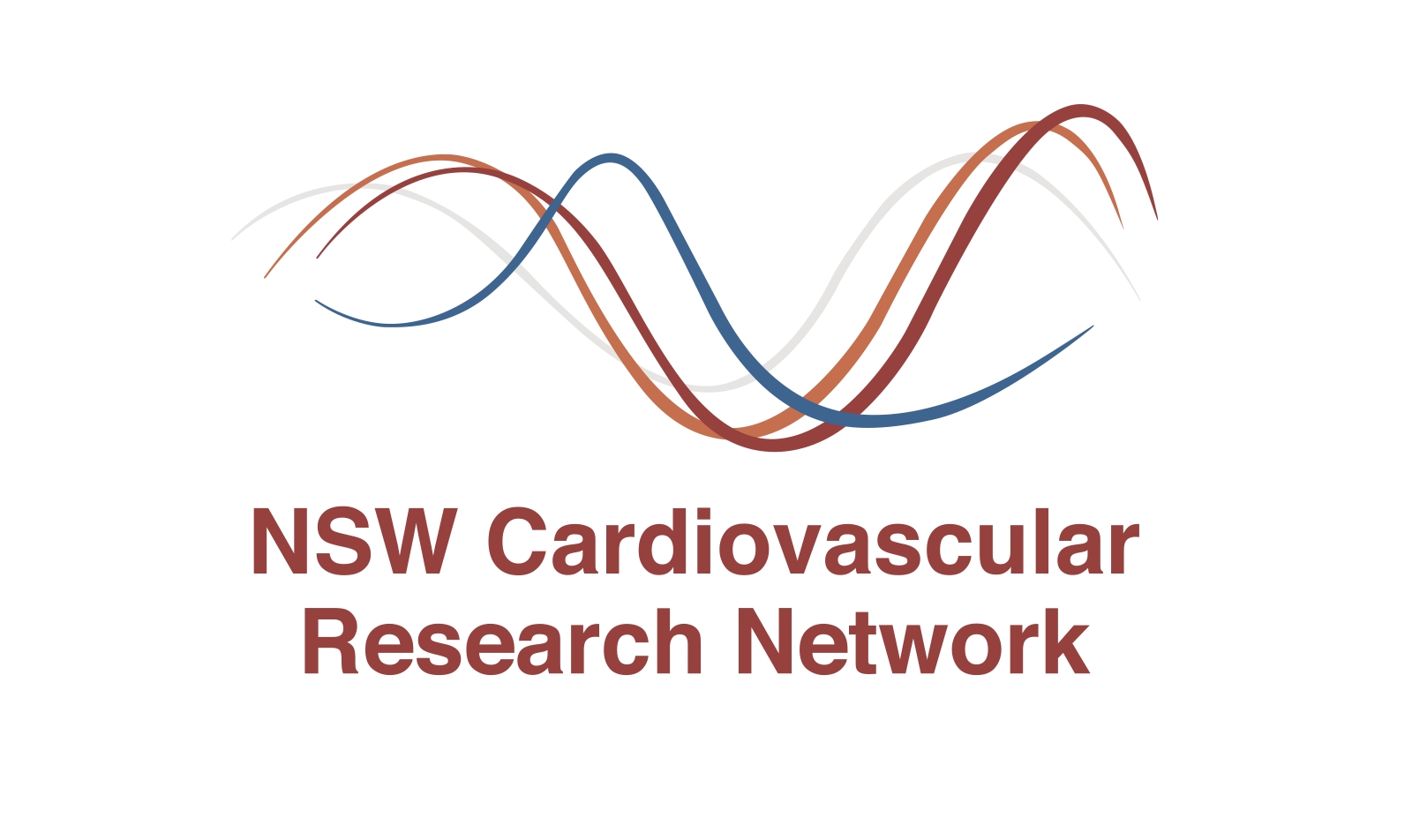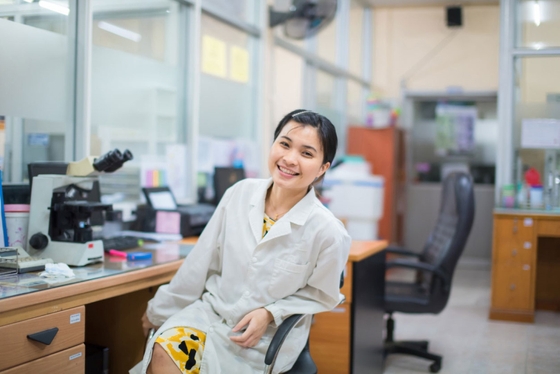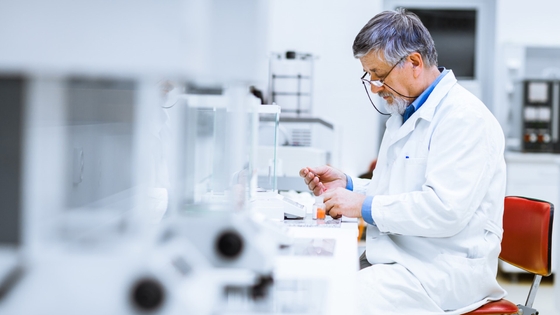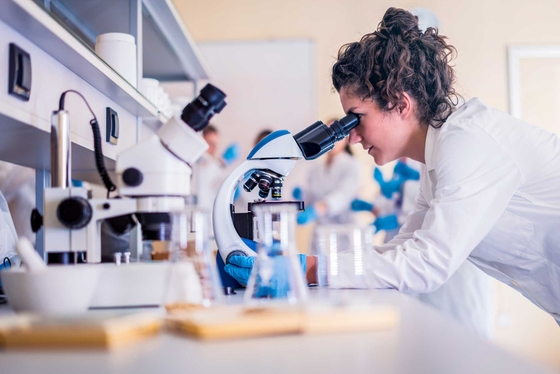
NSW Cardiovascular Research Network (NSW CVRN)
Encouraging cardiovascular research excellence in NSW
The Heart Foundation has facilitated the establishment of the network with the support of the NSW Department of Health. A ground-breaking collaboration bringing together for the first time the state’s most eminent cardiovascular researchers.
Combining expertise in the fields of heart disease, stroke, diabetes and kidney disease, the CVRN promises to deliver results that will improve health outcomes for patients and reduce the financial burden of cardiovascular disease on our health system.
Despite being the most populous state in the country, NSW is consistently under-represented in the number of research grants that are awarded in the cardiovascular research area.
CVRN comprises 14 umbrella member organisations and over 50 affiliated research institutions who actively participate in the network with the purpose of encouraging collaboration and commitment to cardiovascular research and supporting the research workforce in NSW.
More researchers are joining as they become aware of the network, its potential and power through leverage and interaction.

CVRN Executive Committee
In 2021, the NSW CVRN transitioned to a new governance structure, including a new Executive Committee which drives the strategic direction of the NSW CVRN and endorses high-level activities and initiatives. In 2022 Professor Bob Graham, an original CVRN management committee member, stepped down and was replaced by Professor Kerry-Anne Rye.
The current committee includes:
- Professor Andrew Boyle, (Chair) - Hunter Medical Research Institute
- Professor Sally Inglis (Deputy Chair) - University of Technology Sydney
- Professor Kazuaki Negishi - University of Sydney
- Professor Kerry-Anne Rye, UNSW
- Professor Jamie Vandenberg - Victor Chang Cardiac Research Institute
- A/Prof Aaron Sverdlov - University of Newcastle
- Dr Monique Francois - University of Wollongong
- Mr Simon Cowie, Heart Foundation
- Ms Pru Goward, Community member
CVRN Rising Stars Sub-Committee
Sitting underneath the Executive Committee is the Rising Star Sub-Committee (established in 2021) which represents the interests of the Early-Mid Career Researchers of the CVRN across our member organisations; guiding the program of EMCR targeted capability and capacity building activities.
Members of this Sub-Committee are EMCRs of the CVRN (with the exception of Jamie Vandenberg).
Opportunities to join this Committee are available annually, advertised via this website and by email.
CVRN Rising Star Sub-Committee members include:
- Jamie Vandenberg (Co-Chair) - Victor Chang Cardiac Research Inst., Cardiac Electrophysiology Team
- Jessica Orchard (Co-Chair) - The University of Sydney, School of Public Health, Faculty of Medicine
- Zoe Clayton - University of Sydney, Westmead Institute for Medical Research
- Alice Gibson - University of Sydney, Menzies Centre
- Angelo Sabag - Western Sydney University, NICM Health Research Inst.
- Audrey Adji - Victor Chang Cardiac Research Inst., Mechanical Circulatory Support Lab
- Isabella Tan - The George Institute
- Chrishan Nalliah - Macquarie University, Macquarie Medical School
- Daniel Beard - University of Newcastle, College of Health, Medicine and Wellbeing.
- Rachel Sutherland - University of Newcastle, Hunter New England Population Health
- John Rihari-Thomas - University of Wollongong, School of Nursing
- Sonali Gnanenthiran - The George Institute, Cardiovascular Program
- Brett Biles - University of NSW, Indigenous Health
- Nona Farbehi - University of NSW, Garvan-Weizmann Centre for Cellular Genomics
- Helen Parker - The University of Sydney, Sydney School of Health Science
- Michael Falster - The University of NSW, School of Population Health
- Peter Su - Institute for Biomedical Materials & Devices (IBMD), UTS
- Seakcheng Lim - Agnes Ginges Centre for Molecular Cardiology, Centenary Institute
- Phoebe Zhou - NICM Health Research Institute, Western Sydney University
Past members:
- Lucy Murtha - University of Newcastle, Medicine and Public Health
- Hayley Croft - University of Newcastle, Biomed Sci & Pharmacy
- Amanda Henry - University of NSW, Women's and Children’s Health
- Xiaoqi Feng - University of NSW, The George Institute
- Arnold Ju - University of Sydney /HRI., Biomed Engineering
- Xia Wang - The George Institute, Neurological program
- Michael Huang - The University of Sydney, NHMRC Clinical Trials Centre
- Jaesung Choi - Centenary Institute / UTS, Cardiovascular and Stroke Program
- Tu Nguyen - University of Sydney, Westmead Applied Research Centre
- Wenbo Peng - University of Technology Sydney, School of Public Health
Grants and awards
NSW CVRN Career's Travel Award
The NSW CVRN Carer’s Travel Award is open to early and mid-career cardiovascular researchers in NSW who have had a poster presentation or abstract accepted for a national or international scientific meeting or conference, and who are the primary caregiver of one or more children under the age of 16 years.
The purpose of the award is to assist the recipient with domestic or international travel to conferences or meetings by contributing to costs associated with the care of their child/ren while they attend the event. The funds can be used in whatever way is deemed most suitable to the recipient’s personal circumstances e.g. to fund an additional carer to attend the conference or fund additional childcare whilst the recipient is away.
Eligibility
Applicants must:
Be no more than 10 years post PhD;
Be the primary caregiver of one or more children under the age of 16 years;
Hold a position at a current financial NSW CVRN Member Organisation;
Have a poster or oral abstract accepted, which is relevant to the field of cardiovascular disease and/or related conditions, for a national or international conference scheduled from June to December 2019 for which they are applying for funding.
Value
Up to $7,000
How to apply
Funding currently not available.
NSW CVRN Professional Development Awards
The NSW CVRN Professional Development Awards support early and mid-career researchers working in the field of cardiovascular disease and related conditions.
These awards enable researchers to disseminate their findings to the wider research community, enhance their professional skills and build professional networks.
Funding of up to $3000 is available per applicant to assist with costs associated with attendance of national and international research conferences and participation in professional development or training courses.
Ministerial Awards for Cardiovascular Research
NSW Health CVD Grants Program - Pre-Application Peer Review
The NSW Cardiovascular Research Network (CVRN) piloted a Pre-Application Peer Review process in November 2019 in conjunction with the NSW Health’s $150 million Cardiovascular Research Capacity Building Program.
The need:
Previous grant round identified opportunities for improvement on general communication/grant writing skills, research translation planning, and career/skill development.
The aim:
To improve the quality of applications by providing constructive feedback on draft grant proposals.
The structure for the program was developed in conjunction with the NSW Office for Health and Medical Research (OHMR) and the Cardiovascular Disease Advisory Sub-Group.
The structure:
Focusing on two of the current CVD funding schemes, the Senior Researcher Grants and the Early to Mid-Career Researcher (EMCR) Grants:
Senior Researcher Grant applicants submitted a draft application which was reviewed by multiple reviewers. Written feedback was provided to applicants for them to amend their proposals prior to submitting to NSW Health. Twelve Senior Researchers participated in the peer review process.
EMCR Grant applicants were invited to attend a one-day workshop in Sydney. The workshop included:
Cardiovascular Research Capacity Grants - by Dr Stephanie Blows, OHMR
Knowledge translation as a pathway to impact - by Luciano Melo, The Sax Institute
Writing for Humans - by Alex Gedye from The Happiness Concierge
Two rounds of ‘speed dating’ sessions
Applicants received verbal feedback on their application from up to four reviewers.
Over Fifty EMCRs participated in the workshop.
Overall, the pilot program was a success, with feedback received following the EMCR workshop in particularly being extremely positive.
NSW Rising Stars
Top forum for top researchers
CVRN’s member institutions are acutely aware of the need to foster and support our early and mid-career researchers (ECRs/MCRs) in the related disciplines of cardiovascular disease, stroke, diabetes and renal disease, particularly in the highly competitive and difficult world of survival through research grants.
We have therefore created a unique new interdisciplinary and cross-institutional forum where ECRs and MCRs can meet and develop mutually beneficial collaborations, share information and develop relationships which otherwise may be inaccessible to them.
Download an application form to become a member (DOCX)
If you are an ECR or MCR of one of our member organisations and want to get involved, please contact us at [email protected]
NSW Cardiovascular Research Network Women and Heart Disease Grant
There is a scarcity of gender-specific data on women. Also, evidence that both treatment and outcomes are poorer for women with heart disease than they are for men is increasing.
In 2015 The Hon. Pru Goward, then Minister for Medical Research announced the launch of the inaugural Women and Heart Disease Grant. The grant was awarded for the first time in 2016, thanks to funding from the Maple-Brown Family Trust. This was leveraged through the Women and Heart Disease Program.
The grant’s aim was to build our databank of knowledge while increasing specialised research capacity in this area. With increased knowledge and research capacity, our understanding, diagnosis, treatment and outcomes for women with heart disease can improve.
Past recipients
2017 Professor Emily Banks
Project title: Large-Scale linked and clinical data to quantify and address gender-based variation in cardiovascular disease risk factors, incidence, care and outcomes.
For this study, a multidisciplinary team will draw on seven data sources. These include national surveys, large-scale linked data and detailed clinical datasets. It will quantify outcomes in, and learn relative and absolute differences between, women and men. Including for:
CVD risk factors and prevention of future heart attacks and strokes
CVD hospital admissions and deaths from different types of CVD. This includes heart attacks, strokes, heart failure and peripheral vascular disease
The receipt of CVD procedures in hospital following an acute CVD event. This includes secondary preventative measures
Physical disability, psychological distress and quality of life after a CVD event.
Preliminary data proves feasibility and stark disparities in care and outcomes. When the project is complete, Australia will have integrated data on gender disparity for many CVD types across the CVD journey. This data will support targeted intervention to improve prevention, care and outcomes for CVD in women.
2016 Prof Elizabeth Sullivan
Project title: NSW longitudinal study of first-time mothers with heart disease and their babies.
While it’s recognised that the extra workload on the heart during pregnancy can result in complications, sometimes catastrophic, the long-term impact on surviving women is poorly understood.
This study of first-time mothers with heart disease and their babies will examine the long-term impact of pregnancy on cardiac disease progression of over 800 women. The study examined mothers who were giving birth in 2017.
This is the first project of its kind conducted worldwide. It will establish a national research resource that provides an evidence base to governments, clinicians, advocacy groups and women of reproductive age with heart disease. The project takes a holistic view of health. By using a combination of surveys and data linkage, the study will examine various factors throughout women’s lifespans. These include:
Socio-demographic factors
Risk factors and health behaviours
Use of health services
Clinical management and outcomes, including mortality.
The study draws on a strong network of researchers and clinicians straddling cardiac, obstetric, maternal-foetal medicine and Aboriginal health. The overarching aim is to improve outcomes for the increasing number of women with heart disease who become pregnant.
45 and Up Research Opportunity Recipients Announced
The 45 and Up Study, managed by the Sax Institute, is one of the largest ongoing cohort studies of healthy ageing in Australian and the world.
The 45 & Up Study Research Opportunity is an exciting new initiative, formed through a partnership with the Heart Foundation, Sax Institute, and the NSW CVRN. It provides early to mid-career researchers (EMCRs) of the CVRN, access to the unique 45 and Up Study survey data along with other key datasets. The aim of this opportunity is to support short-term projects, led by EMCRs, that address knowledge gaps in cardiovascular disease research in NSW, which align with state and/or Heart Foundation research priorities.
Eighteen highly competitive applications were received for this initiative and were reviewed by a panel consisting of members of the Sax Institute, CVRN, Heart Foundation and an independent reviewer. The review panel commended all applicants on the quality and diversity of the projects, and their potential to generate high-impact outputs with significant clinical and public health benefits.
Unfortunately, only five projects were able to be supported. However, given the success and interest in this opportunity we hope to launch this initiative again, in 2021.
Congratulations to the following successful recipients of the 45 and Up Research Opportunity and thankyou to all applicants who participated in this scheme.
Recipients
| Lead Chief Investigator | Project Title | Institute |
|---|---|---|
| Jennifer White | Understanding health care use by Australian's with cardiovascular disease: Change in health status and service over time. | University of Newcastle |
| Wenbo Peng | Quantifying the health and economic impact of maintaining or adopting a healthy lifestyle in people with heart diseases. | University of Technology, Sydney |
| Kalinda Griffiths | Developing an Australian cardiovascular risk assessment tool for people with cancer aged 45 years and older. | University of NSW |
| Chrishan Joseph Nalliah | Atrial fibrillation risk and management in women: a prospective Australian study | Macquarie University Hospital |
| Anna Campain | Predicting non-adherence in heart attack survivors | The George Institute |
NSW CVRN-VCCRI Research Innovation Grant - 2022 Recipients Announced
The NSW CVRN-VCCRI Research Innovation Grant is an exciting new initiative, formed through a partnership with Victor Chang Cardiac Research Institute (VCCRI) and the NSW CVRN. It provides early to mid-career researchers (EMCRs) of the CVRN access to cutting-edge instrumentation, training and expertise of the Innovation Centre for short-term research projects that focus on cardiovascular disease and health. Five grants were available in this round.
The VCCRI Innovation Centre, proudly supported by the NSW Government, provides access to state-of-the-art equipment and high-quality training and expertise to Australian researchers, with prioritisation of cardiovascular researchers in NSW.
Congratulations to the following successful recipients of the 2022 NSW CVRN-VCCRI Research Innovation Grant.
| Lead Chief Investigator | Project Title | Institute | |
|---|---|---|---|
| Dr Jaesung Peter Choi | Elucidating the role of the microbiome in cerebral cavernous malformation induced stroke | Centenary Institute | |
| Dr Daniel Beard | Investigating the role of pericytes in leptomeningeal collateral vessel function | University of Newcastle | |
| Dr Kayleigh Bozon | Longitudinal analysis of NAD deficiency over gestation to determine how timing dictates malformation type and severity | Victor Chang Cardiac Research Institute | |
| Dr Kirsten Coupland | Mapping temporal changes in cerebrospinal fluid composition after stroke for future drug discovery | University of Newcastle | |
| Dr Pierre Qian | Mechanisms underlying therapeutic effects of ionizing radiation on cardiomyocyte arrhythmias | Westmead Applied Research Centre |
This scheme will be available again in Q4 2022.
NSW CVRN Career Advancement Grant
Providing funding to EMCRs who are returning to research after a significant leave of absence to subsidise activities to build the capacity and capability of these researchers and enhance their career track records. The scheme is aimed at increasing the competitiveness of these EMCRs when applying for future research grant funding.
| Umbrella Organisation | Local Health District Areas | Non-incorporated affiliated Institution |
|---|---|---|
|
||
|
||
|
||
|
|
|
|
|
|
|
|
|
|
|
|
|
||
|
||
|
|
|
|
|
|
|
|
|
|
|
|
|

South Australian Cardiovascular Research Network (SA CVRN)
Elevating cardiovascular research in South Australia by fostering collaboration, building research capacity, and advocating for the significance of cardiovascular research.

Queensland Cardiovascular Research Network (QCVRN)
Launched by the Governor of Queensland in November 2015, the Queensland Cardiovascular Research Network (QCVRN) provides a framework to strengthen cardiovascular research in Queensland.

Western Australian Cardiovascular Research Alliance (WACRA)
WACRA is the voice of Western Australian cardiovascular researchers
Last updated05 February 2024